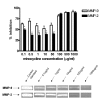Delayed minocycline inhibits ischemia-activated matrix metalloproteinases 2 and 9 after experimental stroke
- PMID: 16846501
- PMCID: PMC1543649
- DOI: 10.1186/1471-2202-7-56
Delayed minocycline inhibits ischemia-activated matrix metalloproteinases 2 and 9 after experimental stroke
Abstract
Background: Matrix metalloproteinases 2 and 9 (MMP-2 and MMP-9) are increased in the brain after experimental ischemic stroke in rats. These two proteases are involved with the degradation of the basal lamina and loss of stability of the blood brain barrier that occurs after ischemia and that is associated with thrombolytic therapy in ischemic stroke. Minocycline is a lipophilic tetracycline and is neuroprotective in several models of brain injury. Minocycline inhibits inflammation, apoptosis and extracellular matrix degradation. In this study we investigated whether delayed minocycline inhibits brain MMPs activated by ischemia in a model of temporary occlusion in Wistar rats.
Results: Both MMP-2 and MMP-9 were elevated in the ischemic tissue as compared to the contra-lateral hemisphere after 3 hours occlusion and 21 hours survival (p < 0.0001 for MMP-9). Intraperitoneal minocycline at 45 mg/kg concentration twice a day (first dose immediately after the onset of reperfusion) significantly reduced gelatinolytic activity of ischemia-elevated MMP-2 and MMP-9 (p < 0.0003). Treatment also reduced protein concentration of both enzymes (p < 0.038 for MMP-9 and p < 0.018 for MMP-2). In vitro incubation of minocycline in concentrations as low as 0.1 mug/ml with recombinant MMP-2 and MMP-9 impaired enzymatic activity and MMP-9 was more sensitive at lower minocycline concentrations (p < 0.05).
Conclusion: Minocycline inhibits enzymatic activity of gelatin proteases activated by ischemia after experimental stroke and is likely to be selective for MMP-9 at low doses. Minocycline is a potential new therapeutic agent to acute treatment of ischemic stroke.
Figures




Similar articles
-
Minocycline and hypothermia for reperfusion injury after focal cerebral ischemia in the rat: effects on BBB breakdown and MMP expression in the acute and subacute phase.Brain Res. 2008 Jan 10;1188:198-206. doi: 10.1016/j.brainres.2007.10.052. Epub 2007 Nov 26. Brain Res. 2008. PMID: 18031717
-
Extension of the thrombolytic time window with minocycline in experimental stroke.Stroke. 2008 Dec;39(12):3372-7. doi: 10.1161/STROKEAHA.108.514026. Epub 2008 Oct 16. Stroke. 2008. PMID: 18927459 Free PMC article.
-
Closure of the blood-brain barrier by matrix metalloproteinase inhibition reduces rtPA-mediated mortality in cerebral ischemia with delayed reperfusion.Stroke. 2003 Aug;34(8):2025-30. doi: 10.1161/01.STR.0000083051.93319.28. Epub 2003 Jul 10. Stroke. 2003. PMID: 12855824
-
Diverse roles of matrix metalloproteinases and tissue inhibitors of metalloproteinases in neuroinflammation and cerebral ischemia.Neuroscience. 2009 Feb 6;158(3):983-94. doi: 10.1016/j.neuroscience.2008.06.025. Epub 2008 Jun 19. Neuroscience. 2009. PMID: 18621108 Free PMC article. Review.
-
Metalloproteinase and stroke infarct size: role for anti-inflammatory treatment?Ann N Y Acad Sci. 2010 Oct;1207:123-33. doi: 10.1111/j.1749-6632.2010.05734.x. Ann N Y Acad Sci. 2010. PMID: 20955435 Review.
Cited by
-
In vivo animal stroke models: a rationale for rodent and non-human primate models.Transl Stroke Res. 2013 Jun;4(3):308-21. doi: 10.1007/s12975-012-0241-2. Transl Stroke Res. 2013. PMID: 23682299 Free PMC article. Review.
-
Vascular protection in diabetic stroke: role of matrix metalloprotease-dependent vascular remodeling.J Cereb Blood Flow Metab. 2010 Dec;30(12):1928-38. doi: 10.1038/jcbfm.2010.120. Epub 2010 Jul 28. J Cereb Blood Flow Metab. 2010. PMID: 20664613 Free PMC article.
-
Post-Ischaemic Immunological Response in the Brain: Targeting Microglia in Ischaemic Stroke Therapy.Brain Sci. 2020 Mar 11;10(3):159. doi: 10.3390/brainsci10030159. Brain Sci. 2020. PMID: 32168831 Free PMC article. Review.
-
Strategies to Extend Thrombolytic Time Window for Ischemic Stroke Treatment: An Unmet Clinical Need.J Stroke. 2017 Jan;19(1):50-60. doi: 10.5853/jos.2016.01515. Epub 2017 Jan 31. J Stroke. 2017. PMID: 28178410 Free PMC article. Review.
-
Blockage of transient receptor potential vanilloid 4 inhibits brain edema in middle cerebral artery occlusion mice.Front Cell Neurosci. 2015 Apr 10;9:141. doi: 10.3389/fncel.2015.00141. eCollection 2015. Front Cell Neurosci. 2015. PMID: 25914628 Free PMC article.
References
-
- Gasche Y, Fujimura M, Morita-Fujimura Y, Copin JC, Kawase M, Massengale J, Chan PH. Early appearance of activated matrix metalloproteinase-9 after focal cerebral ischemia in mice: a possible role in blood-brain barrier dysfunction. J Cereb Blood Flow Metab. 1999;19:1020–1028. doi: 10.1097/00004647-199909000-00010. - DOI - PubMed
Publication types
MeSH terms
Substances
Grants and funding
LinkOut - more resources
Full Text Sources
Other Literature Sources
Medical
Molecular Biology Databases
Miscellaneous

